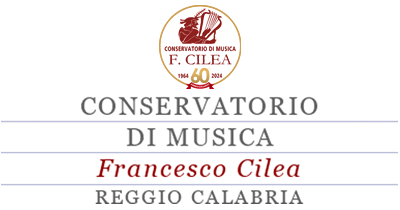 The Conservatorio di Musica “F. Cilea” joined the Erasmus programme in 2007 thanks to the coordination of Prof. Francesco Romano, who has been elected Dean in 2022.
The Conservatorio di Musica “F. Cilea” joined the Erasmus programme in 2007 thanks to the coordination of Prof. Francesco Romano, who has been elected Dean in 2022.
It is a partner of the Higher Conservatories of Las Palmas / Tenerife de Gran Canaria, La Coruña, Madrid, Malaga, Murcia, Valencia (Spain), Lithuanian National Academy of Music in Vilnius, Universities of Kaunas (Lithuania), Ljubljana (Slovenia), Institut Supérieur de Musique et de Pédagogie (Belgium), Conservatorium van Amsterdam (Netherlands), Paderewski Academy in Poznan (Poland), Polytechnic of Porto and University of Évora (Portugal), Janáček Academy of Music and Performing Arts in Brno (Czech), Bartók Béla Music Institute in Miskolc (Hungary), Academy of Performing Arts in Bratislava (Slovakia).
It has organized workshops and master classes with foreign musicians, including Cihat Aşkın, Dolores Tomás Calatayud, Šviesė Čepliauskaitė, Ning Feng, Elizabeth Grard, Marianne Gubri, Chikara Imamura, Dainius Kepežinskas, Algis Kilis, Jérôme Laran, David Milzow, Dick Oatts, Eduardo Pascual, Vadim Pavlov, Charina Quintana, Gilson Silveira, François-Joël Thiollier, Peter Tiboris, Gisbert Watty, Giedrė Zeicaitė.
Founded on August 29, 1964 as a decentralized location of the "S. Pietro a Maiella" in Naples, the Conservatorio di Musica “F. Cilea” was the first public higher education institution founded in Calabria, named after the worldwide known composer Francesco Cilea, born near Reggio (1866-1950). It was officially inaugurated on April 5, 1965 with a concert of teachers and students of the Conservatorio of Naples in the presence of the director of the Conservatorio di Musica "S. Pietro a Maiella", Maestro Terenzio Gargiulo, at the Municipal Theater “F. Cilea” of Reggio Calabria.
The Conservatorio became autonomous by law in 1968.
Now it is located in the historic city center of Reggio Calabria, one of the oldest cities in Europe, fourth in southern Italy (about 185,000 inhabitants), founded by the Chalcidians of Euboea in the eighth century B.C. It is located 200 m from the National Archaeological Museum and about 1 km from the "Mediterranea" and the "Dante Alighieri" universities.
It is part of the national system of Higher Education and Artistic and Musical Specialization (AFAM) and offers musical training courses for the achievement of 1st and 2nd level academic diplomas having legal value equal, respectively, to the bachelor's and master's degree (EQF 6 and 7 under the EU titles).
In addition to pursuing high-level training objectives, it is active in artistic production and theoretical-musicological research.
In 2013 it won the 1st overall prize at the Conservatori a Confronto ("conservatories in comparison") competition, organized by RAI-Italian state television.
The history of the Conservatorio di Musica “F. Cilea” begins in 1927 with the first regular school for musical education in Reggio Calabria, a music high school first private and then erected as a moral institution in 1929, thanks to the work of the director Maestro Giuseppe Scopelliti (1891-1971), a pupil of the composer Nicola D'Arienzo and of the conductor Leopoldo Mugnone. Collecting the legacy of that high school, the “Cilea” is close to the ten Italian historical conservatories (Venice, Naples, Rome, Palermo, Bologna, Milan, Florence, Parma, Pesaro and Turin) and the four territorially relevant ones (Trieste, Bolzano, Bari and Cagliari).
In 1964, as a consequence of the continuous expansion of that music high school and the decisive commitment made by Hon. Giuseppe Reale (1918-2010), a decentralized location of the historical Conservatorio di Musica "S. Pietro a Maiella" of Naples was indeed established in the city. After just four years, it obtained full autonomy and extended to decentralized locations in Messina and Vibo Valentia (autonomous conservatories nowadays). Today, it has about 700 students (in 1964 there were 33) and 104 teachers.
 The Conservatorio di Musica “F. Cilea” has been the only higher music education institution between Naples and Palermo until 1970. It is the fifteenth public conservatory of Italy in chronological order (out of 57, excluding many other similar schools) and was directed by distinguished Maestri such as, among others, Alessandro Cicognini, Terenzio Gargiulo, Paolo Renosto. The first director was Maestro Giacomo Saponaro, composer, conductor, academician of "S. Cecilia ", music critic and composition teacher, awarded by the President of the Republic with the "Gold medal of merit of culture and art".
The Conservatorio di Musica “F. Cilea” has been the only higher music education institution between Naples and Palermo until 1970. It is the fifteenth public conservatory of Italy in chronological order (out of 57, excluding many other similar schools) and was directed by distinguished Maestri such as, among others, Alessandro Cicognini, Terenzio Gargiulo, Paolo Renosto. The first director was Maestro Giacomo Saponaro, composer, conductor, academician of "S. Cecilia ", music critic and composition teacher, awarded by the President of the Republic with the "Gold medal of merit of culture and art".
Maestro Alessandro Cicognini worked hard to spread classical music in the city, and in 1970 he inaugurated the first official concert season at the "F. Cilea" Municipal Theater.The birth of the first symphony orchestra in Calabria occurred in our Conservatorio, in the 70s.
The artistic production mainly consists of the concert season, whose annual regularity since the beginning of the 1980s is due to the participation of teachers and top-notch musicians, in keeping with the objectives of the oldest city concert institution, the Philharmonic Academy, founded in 1929 by Maestro Giuseppe Scopelliti and closed a few years before the outbreak of the Second World War.
The research activity had a strong impetus in 1994 on the occasion of XXX Anniversary of the Institution and since then it has mainly been carried out in the organization of national and international study conferences and in the publication of volumes containing the proceedings of conferences and musicological studies.
As evidence of the quality of the research carried out, the conference proceedings published by the Conservatorio have been reported, examined and positively reviewed by the main Italian and international musicology magazines, such as the Italian musicology magazine (RIdM), Musica, Music and Letters (the prestigious magazine of the Oxford University Press), Notes. The reports contained in the document volumes have been cited and appreciated several times. Research activities are also conducted with the involvement of other institutions, which sponsor or participate in them: the Italian Society of Musicology (SIdM), the Universities of Messina and Palermo, the Institute of Calabrian Music Bibliography (IBIMUS), the Institute for Musical Development of Southern Italy (ISMEZ) and the Conservatorio “A. Corelli" of Messina.
Among the instruments owned by the Conservatorio, it is worth mentioning a Ruffatti pipe organ with mechanical transmission, two manuals, flat parallel pedalboard, 16 registers, 1018 pipes.
 The official logo, adopted following the 1999 reform, is inspired by Ibycus, Greek lyric poet of the Alexandrian canon, born around 575 BC in Reggio. According to tradition, he invented the sambuca, a small triangle-shaped cithara.
The official logo, adopted following the 1999 reform, is inspired by Ibycus, Greek lyric poet of the Alexandrian canon, born around 575 BC in Reggio. According to tradition, he invented the sambuca, a small triangle-shaped cithara.

